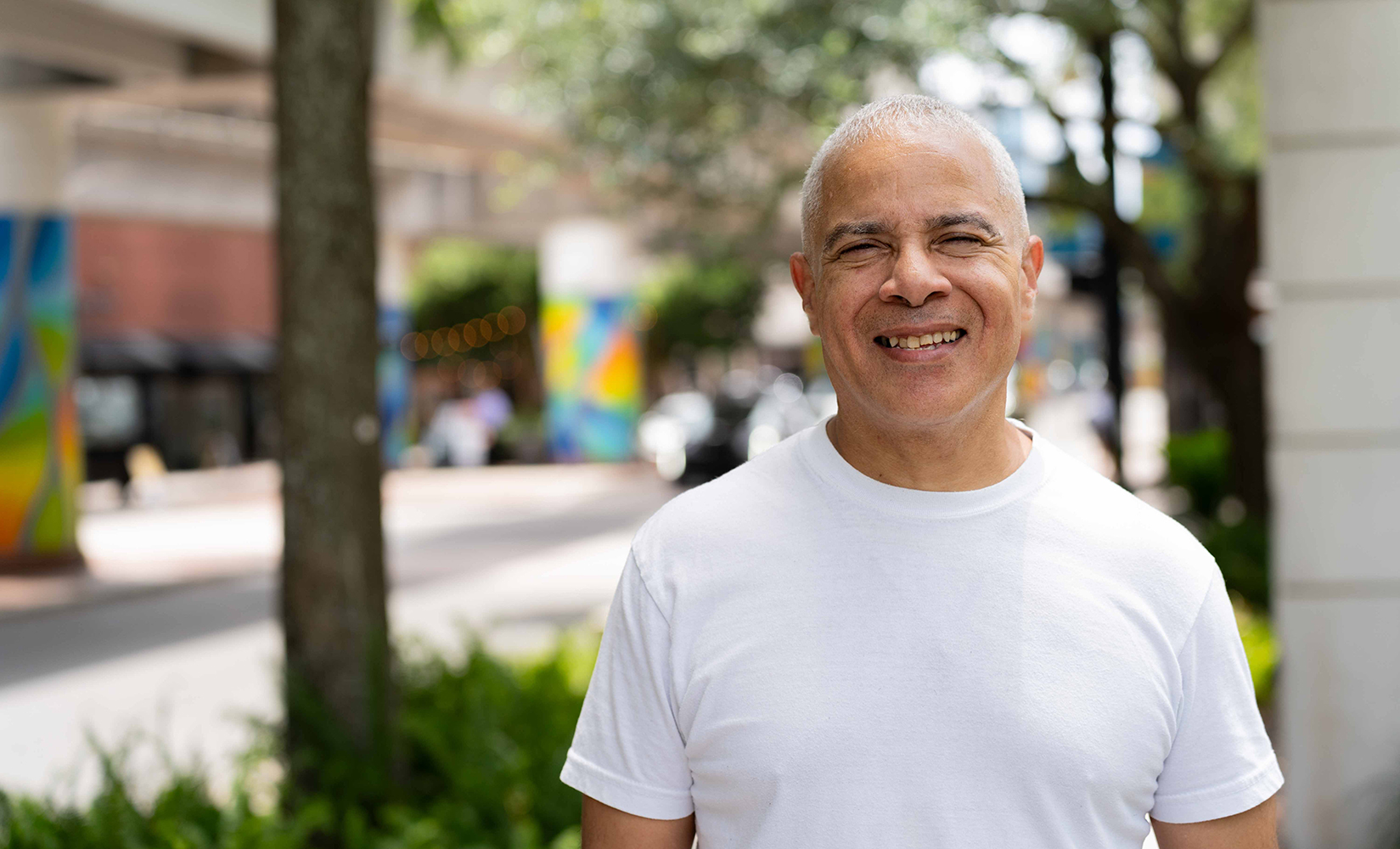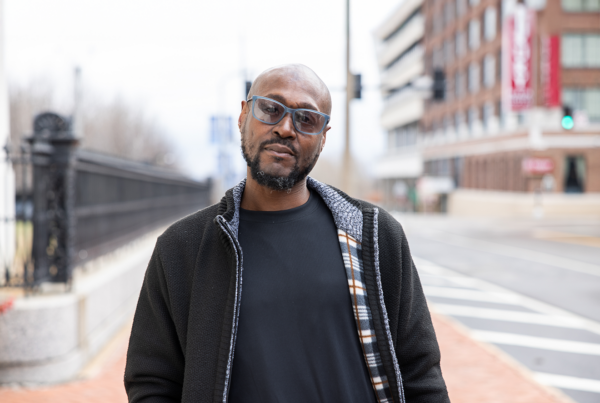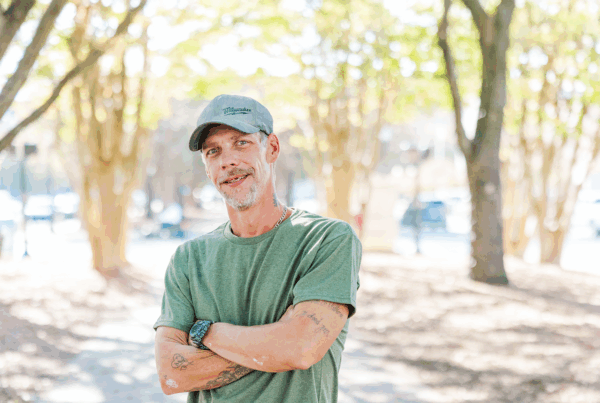The scene inside the pretrial detention facility in Jacksonville was like something taken straight out of a dystopian science-fiction movie. Men were told to sit on one side of the courtroom and women on the other. Everyone’s hands and legs were shackled. Neither a judge nor a public defender was present in that room – they were at the courthouse instead, a mile away across town. Each person had to wait their turn to speak before the judge who appeared remotely via a television monitor. As they sat waiting, a correctional officer offered everyone there some words of advice.
“He told us not to sleep and to try to stay awake because we don’t want to appear disrespectful. He said that in case we got tired we should look up at the ceiling and count how many tiles there are.”
“He told us not to sleep and to try to stay awake because we don’t want to appear disrespectful,” Alfredo, a 55-year-old, recalled hearing the correctional officer say during his arraignment in Jacksonville, Fla. “He said that in case we got tired we should look up at the ceiling and count how many tiles there are.”
Alfredo sat alongside several dozen other incarcerated people. The correctional officer then suggested that everyone think of questions they’d want to ask the judge. “You have to have your questions ready when you get up there,” Alfredo said. “Because otherwise it’ll be difficult to get answers later on.”
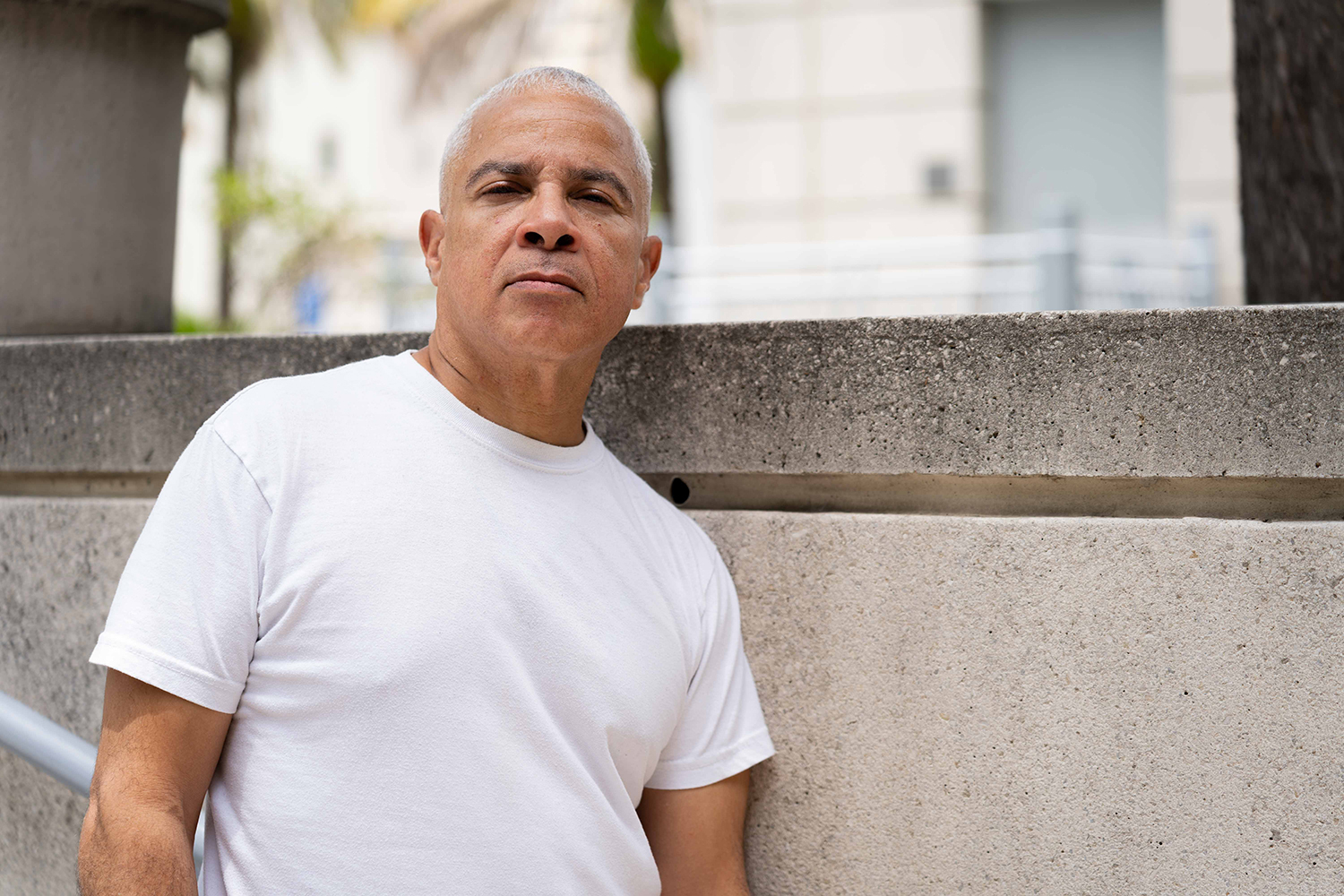 Alfredo didn’t know at the time, but he had actually been appointed a public defender that day he was arraigned. However, no one told him. He also wasn’t given a chance to have a confidential conversation with his public defender before his appearance in court.
Alfredo didn’t know at the time, but he had actually been appointed a public defender that day he was arraigned. However, no one told him. He also wasn’t given a chance to have a confidential conversation with his public defender before his appearance in court.
As Alfredo sat there thinking about what was at stake, he couldn’t believe his predicament. Up until that point, he had spent most of his life doing what he loved most: working as a chef. As a proud Dominican, born and raised in America, Alfredo’s warm hospitality and love for celebrating others is evident in his cooking. He’s made home-cooked meals for NASA astronauts. Managed an oyster bar for tourists vacationing alongside Florida’s beaches. And served up American-style gourmet dishes for students and staff at Cornell University and the University of Florida.
“I’ve cooked almost every realm of cuisine. I’ve always had a lot of opportunities to work in restaurants because of the skills that I brought.”
Alfredo has received much recognition for his culinary expertise over the years, but the Jacksonville, Florida resident still considers himself a life-long student. He points to how a wide variety of cultures have inspired his craft, and are reflected in the diversity of his dishes, which include Italian, French, Puerto Rican, Dominican, and American recipes and elements. “I’ve cooked almost every realm of cuisine,” he said. “I’ve always had a lot of opportunities to work in restaurants because of the skills that I brought.”
But last March, Alfredo was forced to take a step back from his career after he was arrested for a traffic violation. He was driving with a friend one afternoon when he noticed police were signaling him to pull his car over. At the time, Alfredo couldn’t afford to renew his car registration or pay for insurance. He was charged with not having his license plate attached and assigned to his car. Then, when the police searched the passenger riding in Alfredo’s car, they found she was in possession of illegal drugs.
The pair were arrested and Alfredo was taken into custody and booked at John E. Goode Pre-trial Detention Facility in Jacksonville. The next day, he was escorted to court for his arraignment, where that grim dystopian scene was playing out. Alfredo figured that because he’d been arrested for an alleged traffic violation, he’d be released from custody after his arraignment.
After a couple hours, it was Alfredo’s turn to go before the judge. He walked up to the lectern and stood in front of the television monitor. The judge appeared on the screen and began reading his charges out loud. As she did, Alfredo quickly realized that police had not only accused him of a traffic violation, but also of being in possession of drugs. After only a couple minutes reviewing his charges, the judge set Alfredo’s bail at an amount he couldn’t afford: $5,000. He pleaded with her to lower his amount, but the judge refused. Unable to pay, Alfredo was escorted back to his jail cell.
The fact that Alfredo didn’t know a public defender had been appointed to represent him on the day of his arraignment speaks to a commonly overlooked issue that exists in America’s pretrial system.
Arraignments – which sometimes include bail hearings and can be a person’s first time seeing a judge – represent a crucial step in the pretrial process. However, only 10 states currently guarantee counsel at these initial hearings. In much of the country, legal counsel are either not present at all or are available only in a few well-resourced counties in a state. Without an attorney, people are more likely to receive excessive or unreasonable bail amounts that they can’t afford and, as a result, will be unnecessarily detained despite the fact that most states require some consideration of a person’s ability to pay bail.
Such was the case for Alfredo – whose charges were dropped and dismissed one month later. Still, he spent nearly that entire duration behind bars even though he was ultimately not convicted of any crime. During a person’s first bail hearing, either a judge or magistrate is tasked with determining the likelihood of whether someone will appear in court and any public safety concerns if the person is released from jail while their case is pending. But when counsel isn’t guaranteed for the accused, a judicial officer is more likely to make hasty and incorrect decisions. Those who end up being most impacted are often low-income defendants or people of color.
“It was terrible. I remember crying when I couldn’t even get a phone call through to my brothers and daughter.”
On top of how Alfredo’s arraignment unfolded, being incarcerated because of unaffordable bail not only felt cruel, but also like he was being unfairly punished. It put him further in debt and made the prospects of him finding another job as a chef difficult. But above all else, it separated him from his elderly mother, who is experiencing dementia. “It was terrible,” he said. “I remember crying when I couldn’t even get a phone call through to my brothers and daughter.”
Research shows that Alfredo’s experience is not unique. When people cannot afford bail, including those charged with nonviolent offenses, such as Alfredo, they are found to remain in jail anywhere between two and 70 days. Policy and legal experts say, when put together, these incidents raise questions about whether a person’s legal rights are being violated under the Sixth Amendment right to counsel and the Fourteenth Amendment due process right to liberty.
This is not how bail and the pretrial system were ever intended to operate. At the state level, bail systems differ depending on jurisdiction and county. But regardless of locality, bail is a mechanism that was designed to bring about the conditional release of people before trial in order to safeguard the presumption of innocence while ensuring that individuals return to court. According to the U.S. Supreme Court, pretrial detention was not meant to be the norm, but to be the “carefully limited exception.”
After a few days in jail, Alfredo noticed several cellmates incarcerated who didn’t speak English. Many of these people, he learned later, were undocumented immigrants who needed help understanding the status of their cases. One day, after hearing Alfredo speak Spanish on the phone, they approached him and asked for his help. Before long, Alfredo was translating legal documents from English to Spanish, helping coordinate their calls, and offering other translation services. In doing so, Alfredo learned that many of these people were unknowingly being asked to sign their own deportation papers. Without someone there to help translate these legal documents, they were signing away their rights and unintentionally agreeing to be deported.
For Alfredo, this signaled yet another example of how the criminal justice system is able to trample on people’s constitutional rights. He decided to spend as much time as he could, and in whatever capacity he was able, to support and advocate on behalf of his cellmates. “These people have no parents, no brothers, and they’re from a different country,” Alfredo said. “And they have no idea what is happening to them, how long they’ll be in jail, or whether they’ll get deported.”
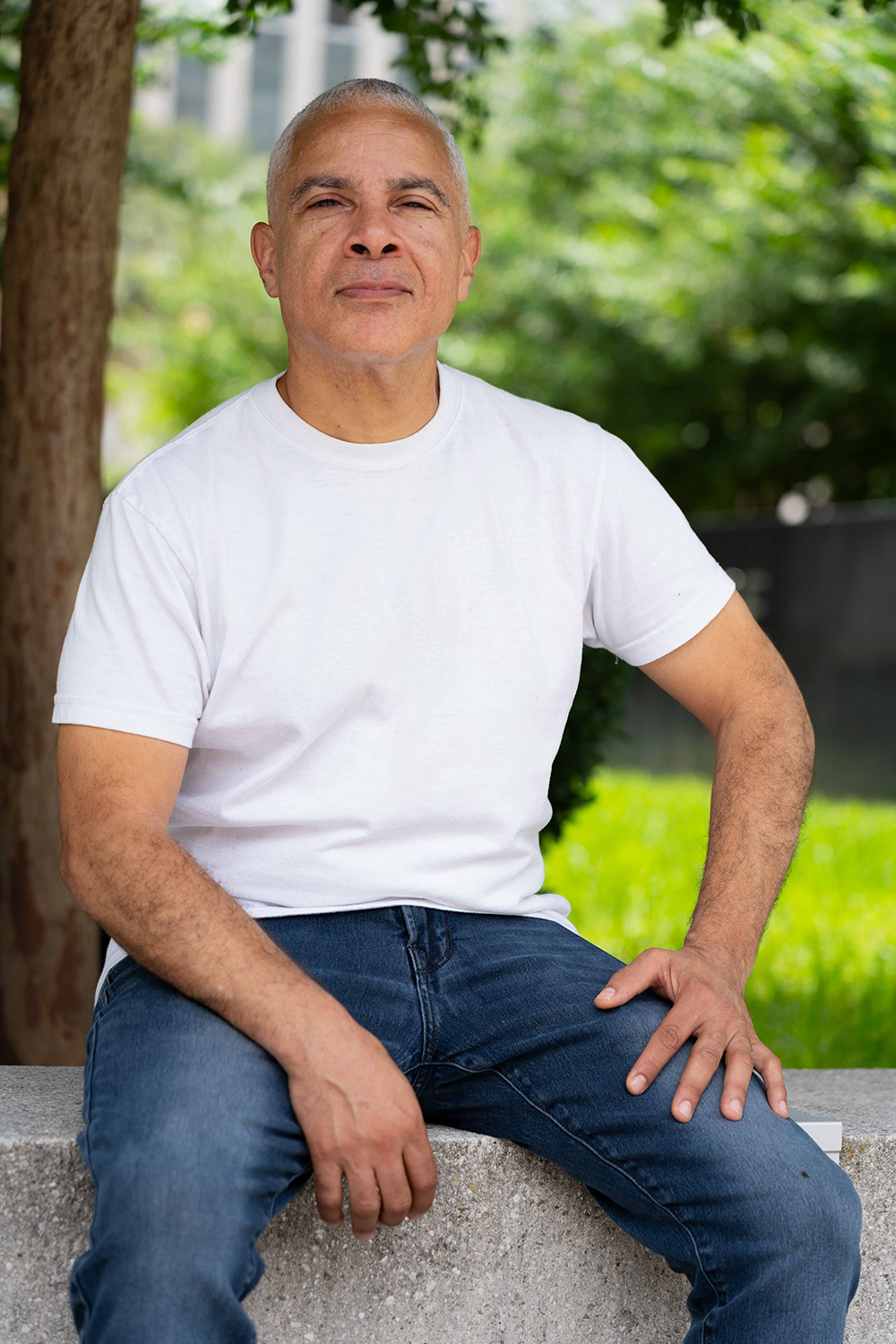
When it came to his own case, Alfredo was facing much uncertainty as well. But finding community and helping others, even in the most unlikeliest of places, gave him hope and brought him comfort. Doing so during times of stress might seem like a huge feat. But that’s how Alfredo was raised. He was born into a large and lively household in Harlem. As a child, he attended Catholic schools with his older and younger siblings. Alfredo was social and outgoing as a kid, but he remembers getting bullied in school because of his heritage. His mother moved from the Dominican Republic to New York in pursuit of better opportunities before Alfredo was born. After settling in Harlem, she found a job as a travel agent. His father and uncles, meanwhile, managed a family business.
Alfredo credits his relatives and family friends for being the first to introduce him to the mesmerizing world of culinary arts. During his early 20’s, he got his first sneak at a high-end restaurant in Manhattan called Gabriel’s. Alfredo was hired there as a busboy. The fast-paced rhythm of the kitchen energized him. The aroma of different spices filling the air spiked his sense of curiosity. He knew immediately that he wanted to work inside the kitchen as a chef. “I made enough money cleaning tables to get an apartment, buy a car, and furnish an apartment,” he said. “I was focused.” Before long, he was employed at a restaurant that his friend, Gary, who graduated culinary school, introduced him to. “I would prepare the salad and would observe the chefs to see how they were cooking,” he said. “That’s how I stepped into the kitchen slowly but surely and learned to cook.”
Despite decades of professional success as a chef, Alfredo was not immune to the financial crisis he suddenly faced in 2020 as a result of the Covid-19 pandemic. Like many people in the food industry, he became unemployed following the government-wide shutdown. Then, one day, he got into a car accident. Because Alfredo was dependent on his car to find work and make money, he continued to drive despite not being able to afford to renew his car registration or pay for insurance.
When Alfredo reflects on how these series of innocuous events eventually led to his arrest, he realizes that despite whatever good intentions someone has or hard work they’ve done, it’s still easy for a person’s life to unravel if they’re poor. Prior to this, he never considered how being in poverty could land someone in jail. To mitigate such harms from continuing to happen to vulnerable people, in recent years places like Illinois, Los Angeles and Harris County, Texas, have begun to reform their bail practices – either by completely eliminating cash bail, restricting its use for certain offenses, or setting guardrails that prohibit excessive bail amounts from being set.
In the meantime, charitable bail organizations, such as The Bail Project, are offering people a lifeline by paying their bail for free. After two weeks in jail, The Bail Project learned of Alfredo’s situation and paid his bail. After he was released, Alfredo continued to make it to all his court dates. He finally felt relief when, one month after his arrest, he learned his charges had been dropped and his case dismissed. Alfredo then enrolled in Operation New Hope’s Ready4Work, a program that provides support and training designed to reconnect people impacted by the justice system to the workforce. With the skills learned and confidence gained from the Ready4Work program, Alfredo had the motivation he needed to jumpstart his career again and start working as a chef.
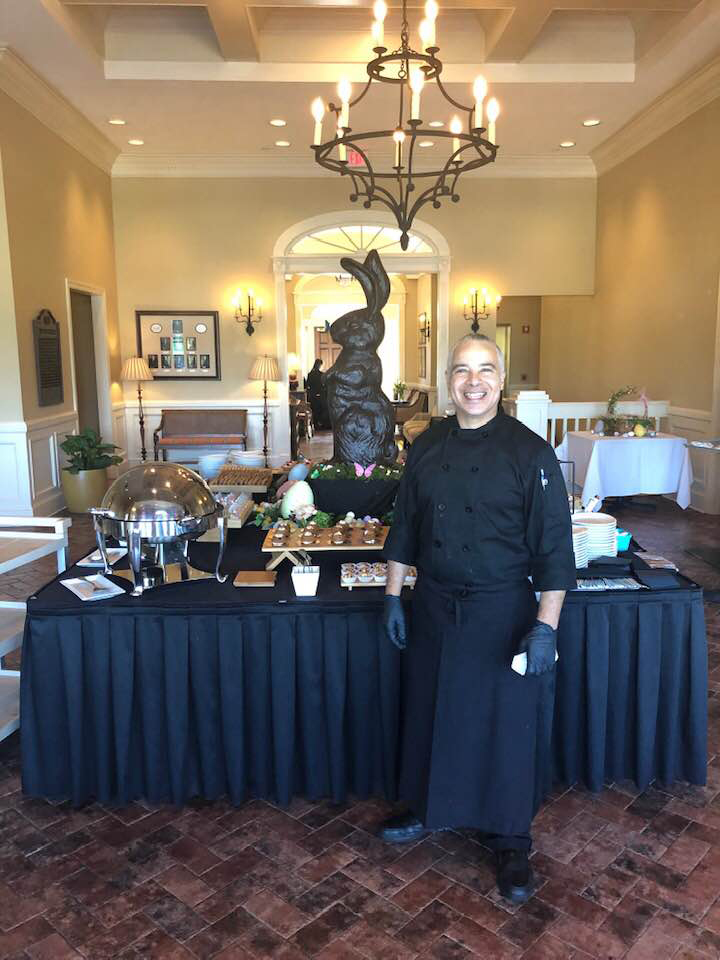 A few months later, Alfredo got the news he had been eagerly waiting for: He was offered a job as a culinary instructor at Clara White Mission – a Jacksonville organization that provides resources to veterans and those living in underserved communities. With his case now behind him and a steady income coming his way, Alfredo is once again able to focus on achieving his long-term culinary dreams, such as owning a food cart selling hotdogs. On days when he needs motivation to help keep his goals alive, Alfredo reminds himself of what a close friend once told him. “She used to tell me that I have a lot to bring to the table,” he said. “And to never undervalue myself.”
A few months later, Alfredo got the news he had been eagerly waiting for: He was offered a job as a culinary instructor at Clara White Mission – a Jacksonville organization that provides resources to veterans and those living in underserved communities. With his case now behind him and a steady income coming his way, Alfredo is once again able to focus on achieving his long-term culinary dreams, such as owning a food cart selling hotdogs. On days when he needs motivation to help keep his goals alive, Alfredo reminds himself of what a close friend once told him. “She used to tell me that I have a lot to bring to the table,” he said. “And to never undervalue myself.”







